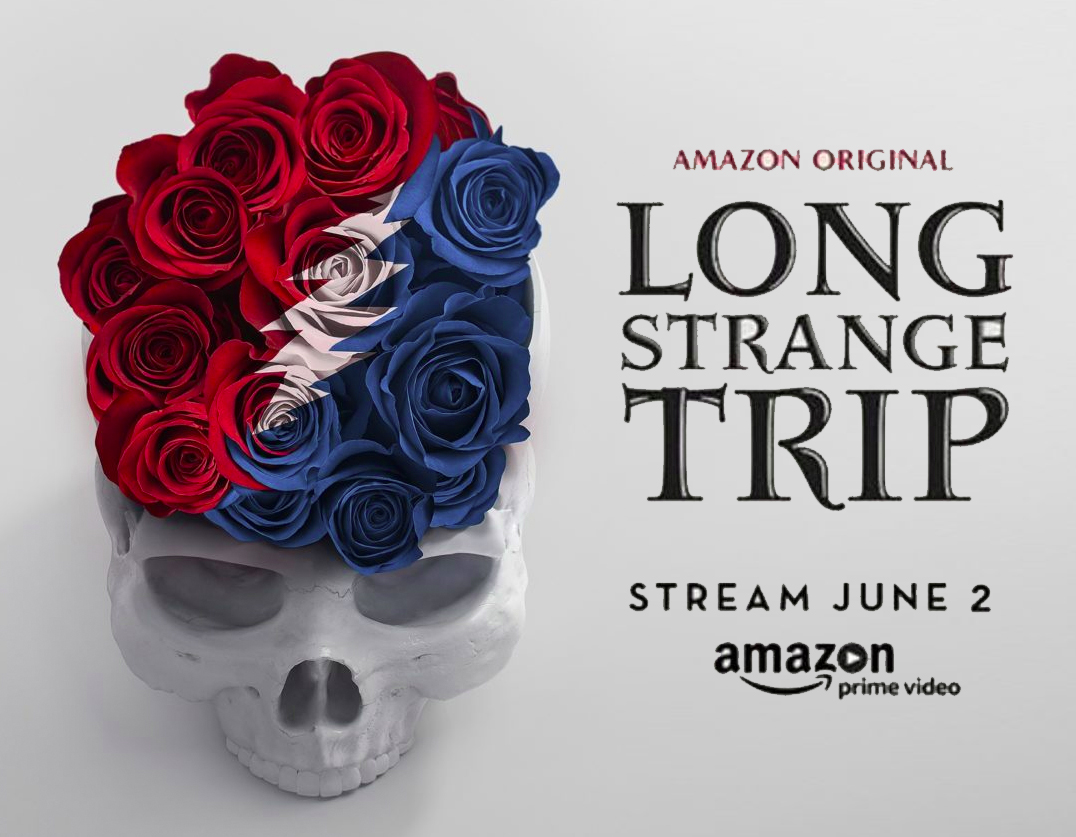
When the long awaited, highly anticipated Grateful Dead documentary, Long Strange Trip, had its premiere at Sundance a few months ago, I was lucky enough to attend and sit in on a post-film talkback with the director, Amir Bar-Lev. I’ve thought about the film a lot since then.
Rolling Stone’s initial review called it heartbreaking; Vanity Fair’s review suggested it may convince some non-heads to take the band seriously. I agree with both, but I have a different perspective.
A fan since discovering the music in middle school, my relationship to the band over the past thirteen years has been professional, but I don’t work for them or with them. I’m an independent licensee of the band, and Little Hippie is a lot different than your typical licensing company. I’m a small business, an independent Deadhead who struck out on her own at a young age, and I came to be in this position by something of a stroke of luck.
It’s a strange thing to work for so long on what is essentially someone else’s trip. But nonetheless this has become my trip too, as it has been for most of my adult life. It hasn’t always been easy. Actually, it’s mostly not been easy, but there are a lot reasons why it’s been worth it, to be explored in other writings.
Although Little Hippie makes products for the whole family, we specialize in children’s apparel. As such, I’ve created art and merchandise that have done much to perpetuate the legacy of the Grateful Dead and pass the music and culture on to the next generation. We’ll get to that in a minute, but first, back to the film.
Let’s start with a joke: the biggest laugh of the film, which many parents might appreciate, came from Sam Cutler’s statement that the “Grateful Dead are dumb.”
Cutler goes on to explain that despite their musical genius, when it comes to business, they’re stupid. Bob Weir reinforces this by saying that though the Grateful Dead has been given credit for creating some innovative business practices, in reality they were just doing what was easiest. I appreciated the dispelling of this myth. Yes, in retrospect, they were ahead of their time in many ways, but none of that was particularly deliberate. In truth, they only made decisions when forced to, which this film does a good job of portraying. In most cases decisions were made by not making them. Jerry’s blatant refusal to be a leader is perhaps the most disheartening part of the whole story, and seeing it so well depicted on film reinforced my belief that he was not a man to be deified. Of course, deification was exactly what he was trying to avoid, which the film also does a great job of conveying.
It was hard to watch this story as it evolved and as Jerry progressively devolved. The audience in the theater was very still and quiet throughout the whole screening, growing even more so as it neared the end. Jerry’s refusal to take any kind of leadership is painfully disappointing, and I credit the filmmakers with portraying the conflicts that caused. They do not deify him, and this is where the film is most honest. Early in the film, the thesis is presented that the Grateful Dead is the most American rock band, and you’ll be left with a thorough understanding of why and no doubt that they in fact were. They are never called the greatest. This isn’t a rock doc in that sense. It’s not meant to make you believe your favorite band was the best band ever.
Long Strange Trip tells the story of a band that wanted to have fun and be free and ultimately suffered later for their immaturity. They were kids when they started and it doesn’t seem like any of them ever really grew up. Like Rolling Stone said, it is heartbreaking to see that for all their creativity and the joy they shared in the early years exploring it, the band members were unable to successfully guide each other through the challenges of life in their later years.
One question I’ve asked myself a lot since seeing this film is whether or not I’d watch it again. Under the right circumstances, yes, I could sit through parts of it at least. I’d like to share it with friends who don’t know much about the band, but I’m pretty sure I’d be that annoying person who footnoted the entire film with the missing information. I doubt I’d watch it on my own again, simply because it was such an emotional undertaking to sit through.
For an uninitiated audience, the soundtrack is a perfect way to discover the music. It goes without saying that the soundtrack was masterfully edited, and it does in fact truly give viewers a wonderful overview of this exceptional oeuvre of songs. I wouldn’t expect anything less from David Lemieux.
Long time listeners too will be far from disappointed, and they’ll enjoy the anecdotes that accompany some of the choicer tracks. This film presents several strong theses, and top of that list is that when it came to the Grateful Dead, nothing else mattered as much as the music, and especially the sound quality. If this was the only thesis, the film would be a home run.
There are some great laughs, a few tender moments, and ultimately some deep tragedy. As promised, there is previously unseen footage that’s worth seeing, and some interviews that are better than others. Before you go thinking you’re going to learn everything about the Dead and the members of the band, let me stop you right now.
This film is about Jerry Garcia – if you ever thought the Grateful Dead was about anything other than Garcia, you’re going to be challenged. The film presents only enough biographical data about Garcia necessary to create context, and none about the other band members other than how and/or when they met Garcia.
It’s a bio about the band, not the people in it, but if this film has a thesis greater than those already listed, it is that the Grateful Dead was Jerry Garcia. You’re going to hear it over and over throughout the film, and this is my chief complaint. The stylistic choice of repeating material, came off to me as a risky, overplayed gimmick for such a long film. By the third time I saw black and white footage of Jerry sticking his tongue out and making funny faces into a backstage camera from 1972’s aborted attempt at a Grateful Dead film, I was over it. I liked it the first time, a bit less the second time, and after that I didn’t like it at all anymore. Same goes for the Frankenstein parallels that Rolling Stone already mentioned and also for the cute pre-1965 footage of Robert Hunter and Jerry Garcia goofing around on the streets of Menlo Park.
It will come as no surprise that I was disappointed to discover zero time was spent exploring the art that is so much a part of the Grateful Dead’s extended universe. Aside from a brief explanation of the meaning of the lightning bolt in the Steal Your Face, no explanation of the origins of any of the other iconography that helped make the band so well known is offered. Although, as the aforementioned reviews said, a thorough examination of the Deadheads was included in the film (seemingly the crowd’s favorite chapter), that section did not discuss the role fans played in developing the rich visual tapestry so well associated with the band. Aside from a quick flash of the art credits on Europe ‘72, Stanley Mouse and Alton Kelly are never mentioned, despite the incontrovertible role they played in creating the imagery that made this band visible in the first place.
Similarly, according to this film, Bill Graham never existed except for being the unnamed character encouraging the band to go play a little “apeaser” for the roaring crowds at Winterland at the close of their 1975 farewell shows. Perhaps there were conflicts with the Bill Graham estate that prevented him from being included that I don’t know about. Regardless, I was surprised that a biography of the Grateful Dead made mention of Bill Graham.
How Sam Cutler instead ended up the star of this film, I’ll never understand. I’ll admit, his contribution to the narrative is great, and his humor provides welcome reprieves from the weight of the story, but putting him front and center did not sit well with me.
What was left out of Long Strange Trip said as much to me about the Grateful Dead as what was included. I fully recognize the monumental undertaking this project was and clearly, much had to be left out. Certainly there are plenty of resources out there if you’re looking for more information, and there’s no reason why this film would have needed to be all-encompassing. It is possible that I know too much and my viewing experience suffered for it, and I’m about as tough a critic as this film will face. Regardless, I am grateful this film was made and I do recommend watching it. Most of all, I hope that it will indeed ensure that the Grateful Dead’s flag continues to wave wide and high. The good news is, there’s plenty of material and music left to explore in future films.



No Comments comments associated with this post